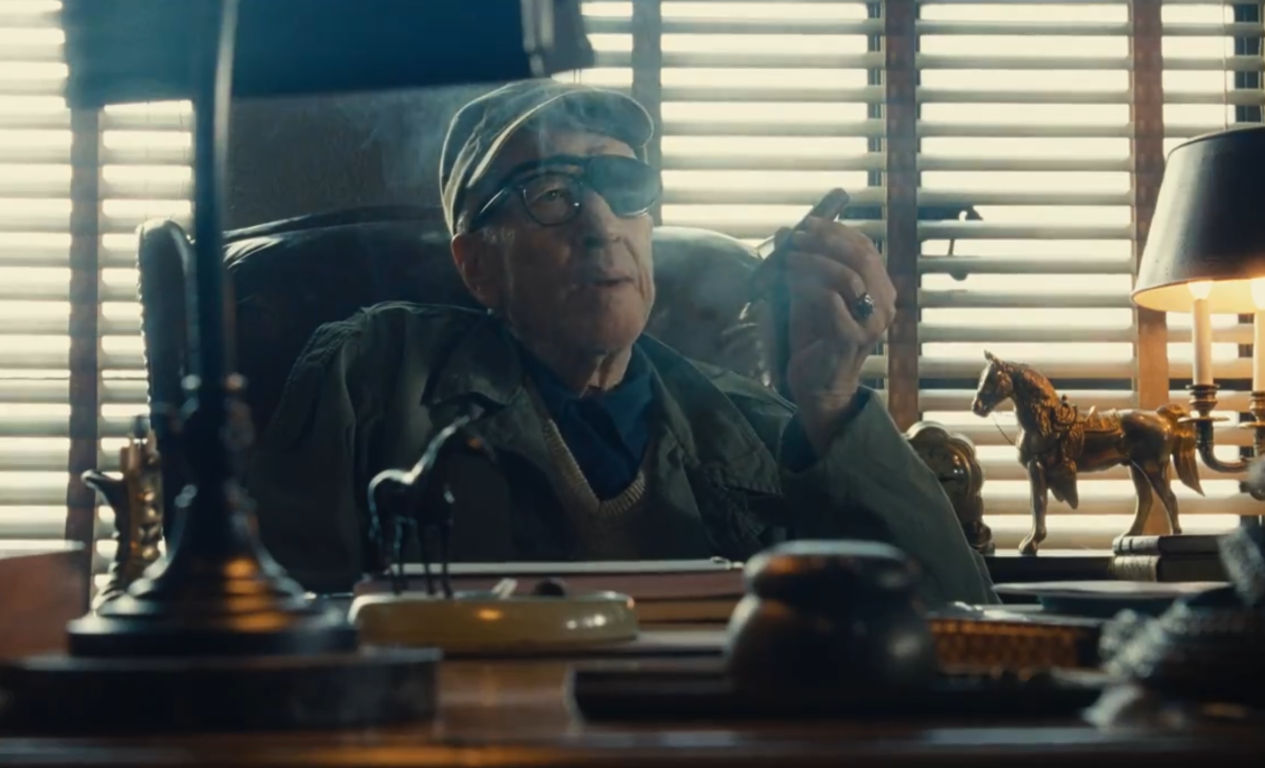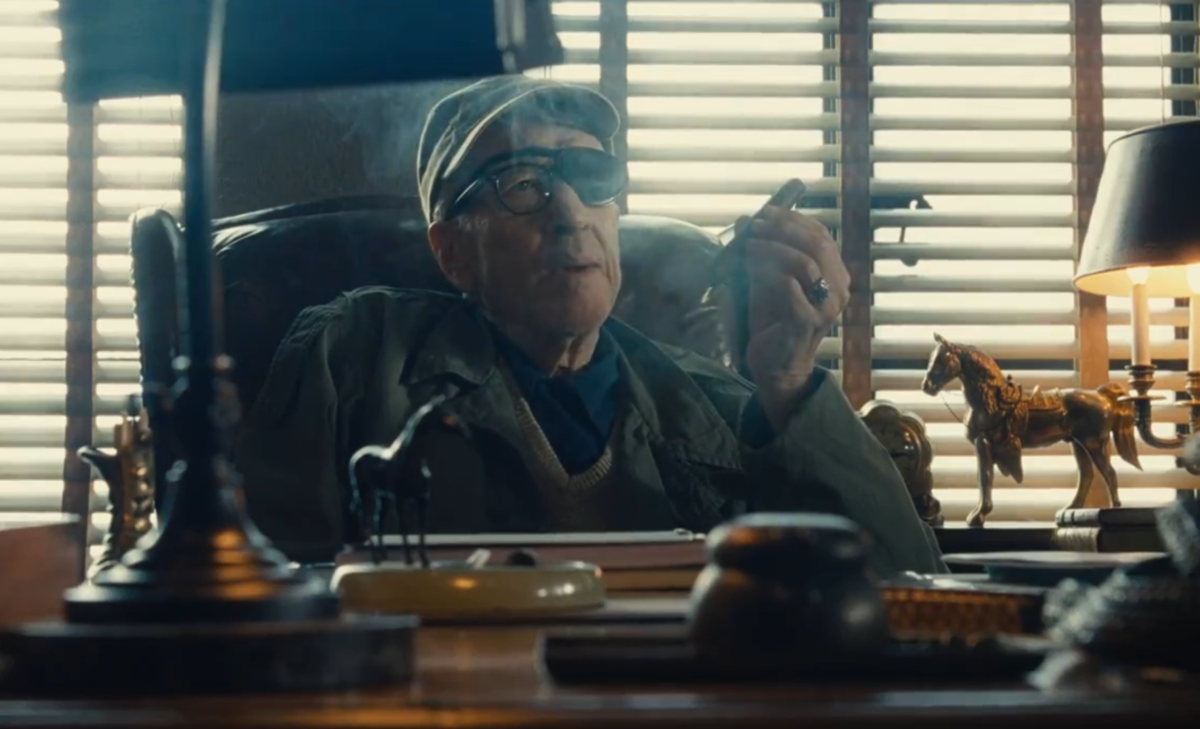

David Lynch playing John Ford in The Fabelmans, dir. Steven Spielberg, 2022.
“Dreams are scary,” says little Sammy Fabelman, when outside a movie theater where he is about to see the first movie of his life. Yes, but what is cinema? According to Sammy’s father, cinema is a series of photographs projected faster than our brain can process, which creates the illusion of motion unfolding before our very eyes. But his mother tells him that cinema is dreams projected onto a screen, dreams “that you will never forget.” Science and art, reality and fantasy, rationality and passion, father and mother (or masculine and feminine, if you like): these seem to be the polarities according to which the cinematographic experience has always been divided. And it has been like this since the Lumières, who considered cinema as a tool to scientifically describe the world, while Georges Méliès was discovering film’s illusionistic and fantastic potentials.
But perhaps even more important are fear and desire, repulsion and attraction: the two contradictory polarities in which the cinematographic gaze has always been caught. When little Sammy overcomes his fear of the dark and finally decides to enter the movie theater, the first film of his life is The Greatest Show on Earth by Cecil B. DeMille. He is awestruck at the scene of the trainwreck, when an automobile is crushed between two trains, sending train cars and passengers flying. Looking at one the most famous wrecks in the history of film, Sammy cannot take his eyes off the screen. But what does he feel when he sees this catastrophic sequence? Is it fear? Anxiety? Desire? It is a primal scene whose content, as Sigmund Freud described, is ambiguous and uncertain and will only be revealed retrospectively, après-coup, depending on what Sammy does with it later in his adult life.
His mother (the polarity of desire) encourages him to use his father’s 8mm camera (the polarity of science and technology) to reenact the scene with a toy train set to “get some kind of control over it.” The desire that glued him to the screen of DeMille’s film will be retrospectively determined by the—singular and unique—reenactment of it through a cinematographic image. Film mixes both desire and technical mastery: it recreates the anxiety and fear (and also erotic attraction) while also serving as an instrument to keep these at bay. Cinema sees more than what life does: it sees too much of the real. And sometimes it makes things emerge that we would prefer not to see, just like in dreams. At the same time, it also protects against that which it conjures and acts as a shield against the traumatic intrusion of the real.
It’s no secret: The Fabelmans is a fictionalized story of Steven Spielberg’s childhood and adolescence. Yet the biographical element is inextricably intertwined—not without a certain immodest grandeur—with the history of film itself. The way that Sammy deals with his life through the movie camera is redoubled by the infancy and innocence of cinema. The first 8mm movies that Sammy makes, in which he casts his sisters and Boy Scout friends in his storytelling and editing experiments, resonate with the early years of cinema, with the discovery of comedy, slapstick, horror, and then westerns and war films, in a crescendo of complexity that marks at the same time Sammy’s increased technical mastery of the medium and a personal and subjective growth. Also, like in the early days of cinema, Sammy’s first films are silent, since his 8mm camera does not record sound; during Sammy’s amateur screenings at school, the images are accompanied by recordings on vinyl, in a way not dissimilar to the early silent era.
In this journey of discovery, a turning point arrives with Sammy’s first experience of disenchantment during a camping holiday where the Fabelmans—the father Burt, the mother Mitzi, and sisters Reggie, Natalie, and Lisa—are joined by Burt’s best friend and Sammy’s “putative uncle,” Bennie. When his mother, in a moment of subjective destitution and loss of reality, starts to bizarrely dance in front of the entire family, something odd emerges, which perhaps has to do with the register of her sexuality. The father tells Sammy to take his 8mm camera and shoot the scene, while one of the sisters exhorts him to not look (the typical double bind in the erotics of the gaze): “Mom, stop! We can see through your dress.” This sexualization of the gaze is one of the many legacies of the cinematographic experience, the most shocking and conflictual one. And isn’t this one of the main features that has always distinguished the erotics of the gaze: not being able to look away from the screen, yet not being able to look at it either?
The shocking revelation will arrive when Sammy starts editing the film prints of the camping trip—something that his father (maybe unconsciously?) urges him to do to help his mother mourn the loss of her own mother—though Sammy, not yet an adult, would prefer to play around with his childish 8mm westerns. The images will have a cathartic effect on the mother, who will see on the screen that a familial happiness is still possible despite her loss. But the price that Sammy will have to pay for this is very high. From that moment on, Sammy loses his childhood. While he had pointed his camera at bucolic scenes of his father warming marshmallows over a fire and his sisters making faces and playing in the woods, when he’s at the editing machine something else suddenly takes shape: a caress that Mitzi directs imperceptibly towards Bennie, their eyes meeting almost casually, expressing something more than mere friendship, and their hands, away from the eyes of the rest of the family, slightly touching.
This is the greatest lesson of the cinematographic apparatus, which precipitates the adulthood of Sammy, but also the maturity of cinema itself. Cinema is not only about playing with and mastering the tricks of the camera. The dreams “that you will never forget” can sometimes be disturbing or anxiety-inducing. Such is the real of “the photographic” that shattered the sensibility of the system of the arts of the nineteenth century and traversed the twentieth century, from Epstein to Bazin, and from Barthes to Deleuze. Alongside what the filmmaker would like to see via the camera, sometimes something more, or something less, or simply something different, appears on the film print. There is something profoundly and structurally uncontrollable about the movie camera that inevitably takes the artist hostage and dethrones their presumption of mastery. An image that Sammy did not want to see appears on film against his will, despite the innocence and the naivete of the camping trip. And once seen, it cannot be unseen.
It is through this exposure to both the sexual desire of the Mother (which Freud always considered traumatic for the subject) and the diabolical power of cinema that Sammy will become an adult. It might seem incredible that this comes from a filmmaker like Spielberg, for whom the poetics of childhood, naivete, and innocence have always been quintessential hallmarks. And yet The Fabelmans is first and foremost a film about how cinema is an adult form of art, far from the escapist imagination that Spielberg is typically identified with. Cinema is not only the art of enchanting reality or rendering it more bearable. It is the art of truth and the anxiety of the gaze: the experience of seeing something we did not know could be seen.
This is how Sammy will learn of his mother’s adulterous affair with Bennie well before his sisters: cinema makes him aware of something that in real life was not yet visible (the rest of the family will only discover it when the couple announces their divorce). Sammy’s craft—his adult one—will consist in learning how to domesticate this “diabolical” power of the camera, how to become the “master” of these dreams. Naturally, Spielberg’s story can only turn out to be a Hollywood parable with a happy ending: the experience of being paralyzed in front of those images and dreams (the child who watches Cecil B. DeMille and does not know whether to be frightened or excited) leads to the power of manipulating an audience (the child who reenacts the scene with a toy train set and an 8mm camera to “get some kind of control over it”).
Isn’t this the great dilemma, and division, that has always troubled the cinematographic experience? Should we consider film from the perspective of looking at images and inhabiting their anxiety, or as the art of manipulating images? Is cinema an art of the gaze or of the hand? Of the passive recording of the photographic or of the activity of montage? It might seem obvious to place Spielberg in the latter camp, and yet I wonder why he chose to end his most autobiographical film by staging his renowned encounter with John Ford, with none other than David Lynch in the role of Ford. Perhaps because even when we think we have learned to tame the anguish of our dreams, something of it is bound to return.
